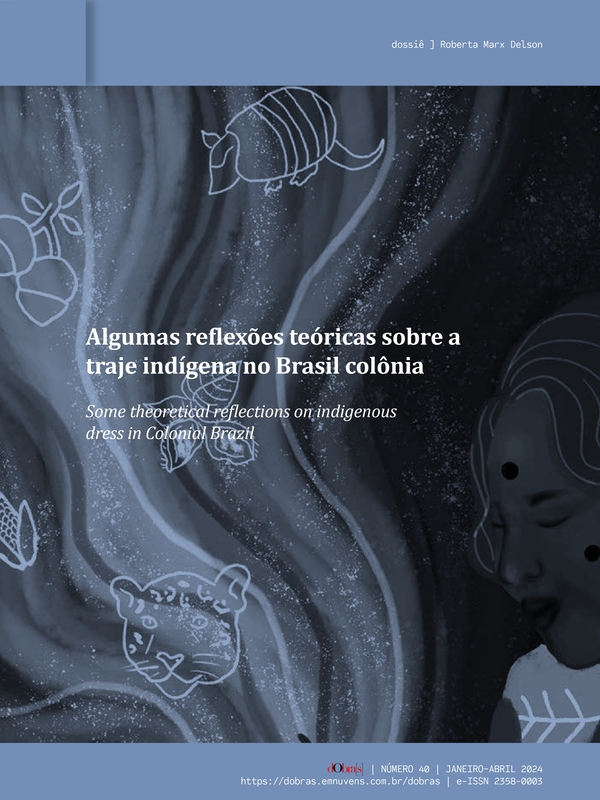Some theoretical reflections on indigenous dress in Colonial Brazil
DOI:
https://doi.org/10.26563/dobras.i40.1813Keywords:
Adornment, Directorate, “Dress”, Maintenance of social orderAbstract
This article is a preliminary attempt to apply current social theories of adornment as “dress” and “dress” as signifier of class to the issue of indigenous dress in colonial Brazil. Drawing upon the analysis of Joanne Entwistle, I examine encounters between indigenes and the Portuguese colonial administrators which took place over more than three centuries of control. I also interpret orders issued for clothing the native population under the rule of the Directorate. My conclusions reinforce the theories that indigenous adornment can be interpreted as “dress” and, that moreover, the Portuguese understood this concept. Nonetheless, there were contradictions in the Portuguese approach to creating a proletariat from uniformly dressed indigenous workers; the Crown routinely elevated leaders (who were allotted finer clothing) in order to reinforce their dependence upon colonial rulers. While this “dress code” for the indigenous population helped to maintain social order, it was not inevitably followed.
Downloads
References
ANONYMOUS. Description of the Tupinambá,1587. In Robert M. LEVINE and John J. CROCITTI (Eds.), The Brazil Reader: History, Culture, Politics. Durham: Duke University Press, 1999.
ARAÚJO CORRÊA, Luís Rafael. A Aplicação da Política Indigenista Pombalina nas Antigas Aldeias do Rio de Janeiro. Masters Thesis, Universidade Federal Fluminense, Niterói, 2012.
BARICKMAN, B.J. “Tame Indians”, “Wild Heathens”, and Settlers in Southern Bahia in the Late Eighteenth and Early Nineteenth Centuries, The Americas, Vol. 51, p. 325-368, 1995. DOI: https://doi.org/10.2307/1008226
BARNES, Ruth; EICHER, Joanne B. (Eds.) Dress and Gender: Making and Meaning, Oxford: Berg, 1993.
DELSON, Roberta Marx. Translated by Fernando de Vasconcelos Pinto. Novas Vilas Para o Brasil-Colônia: Planejamento Espacial e Social no Século XVIII. Brasília: Editora Alva-Ciord, 1998.
DELSON, Roberta Marx. Beyond Imperial Domination and Resistance: Extrapolating the Late Colonial Amazonian Cultural Landscape from the Visual Record. Yearbook, Conference of Latin Americanist Geographers, Vol. 26, p. 117-130, 2000.
DELSON, Roberta Marx. Versailles on the Guaporé: the Visual Evidence of Vila Bela’s Past Glory. Varia historia, Vol. 30, p. 13-36, 2004.
DELSON, Roberta Marx. Brazil: Origin of the Textile Industry. In Lex Heerma VAN VOSS, Els HIEMSTRA-KUPERUS and Elise VAN NEDERVEEN MEERKERK (Eds.), The Ashgate Companion to the History of Textile Workers, 1650-2000. Farnham (UK): Ashgate Publishers, p. 75-101, 2010.
DICKENSON, John; DELSON, Roberta Marx. Enterprise Under Colonialism: A Study of Pioneer Industrialization in Brazil 1700-1830. University of Liverpool Institute of Latin American Studies Working Paper, No. 12, p. 1-63, 1991.
ENTWISTLE, Joanne. The Fashioned Body: Fashion, Dress and Modern Social Theory, 3rd. ed. Cambridge, U.K.: Polity Press, 2023.
FRANÇA PAIVA, Eduardo. Escravos e Libertos Nas Minas Gerais do Século XVIII: Estratégias de Resistência Através dos Testamentos. São Paulo, 1995.
FERREIRA, Alexandre R. Viagem Filosófica pela Capitania do Grão Pará, Rio Negro, Mato Grosso e Cuiabá, 1783-1792. Iconografía, 2 vols. Rio de Janeiro: Conselho de Cultura, 1971.
FERREIRA, Alexandre R. Memorias da Viagem Filosófica pela Capitania do Grão Pará, Rio Negro, Mato Grosso e Cuiabá, 2 vols. Rio de Janeiro: Conselho de Cultura, 1974.
HEMMING, John. Noble Savages. In Robert M. LEVINE and John J. CROCITTI (Eds.), The Brazil Reader: History, Culture, Politics. Durham: Duke University Press, 1999.
LANGFUR, Hal. The Forbidden Lands: Colonial Identity, Frontier Violence, and The Persistence of Brazil’s Eastern Indians, 1750-1830, Stanford: Stanford University Press, 2006. DOI: https://doi.org/10.1515/9781503625273
LANGFUR, Hal. Adrift on an Inland Sea: Misinformation and the Limits of Empire in the Brazilian Backlands. Stanford: Stanford University Press, 2023. DOI: https://doi.org/10.1515/9781503633971
MADUREIRA, Nuno Luís (Ed.). História do Trabalho e dos Occupações. 3 vols., vol. 3, A Indústria Têxtil. Oeiras, 2001.
PRADO, Jr, Caio. Translated by Suzette Macedo. The Colonial background of Modern Brazil. Berkeley: University of California Press, 1967.
ROLLER, Heather. Contact Strategies: Histories of Native Autonomy in Brazil. Stanford: Stanford University Press, 2021. DOI: https://doi.org/10.1515/9781503628120
SEED, Patricia. American Pentimento: The Invention of Indians and the Pursuit of Riches. Minneapolis: University of Minnesota Press, 2001.
SOARES FERNANDES, Abel, FREITAS ALVES, Angela and DO VALE FERNANDES, Julieta. O Trajo na Madeira: Subsidio para o seu Estudo. Funchal, 1994.
WILSON, Elizabeth. Adorned in Dreams: Fashion and Modernity. London: I.B. Tauris, 2013 (revised edition).

Downloads
Published
How to Cite
Issue
Section
License

This work is licensed under a Creative Commons Attribution-NonCommercial-ShareAlike 4.0 International License.
The copyrights of the works published in this journal belong to the author, and dObra[s] holds the rights of first publication. Due to their publication in this open access journal, any work here is free to use, with its own attributions, in educational and non-commercial applications.









